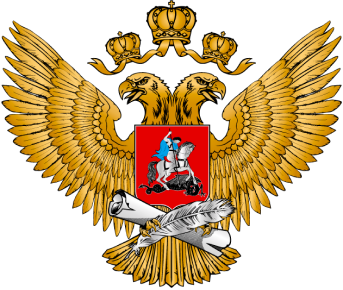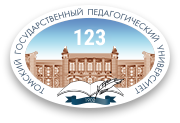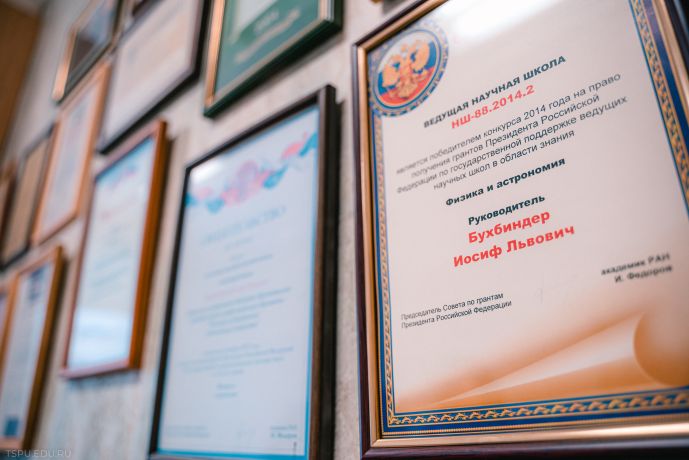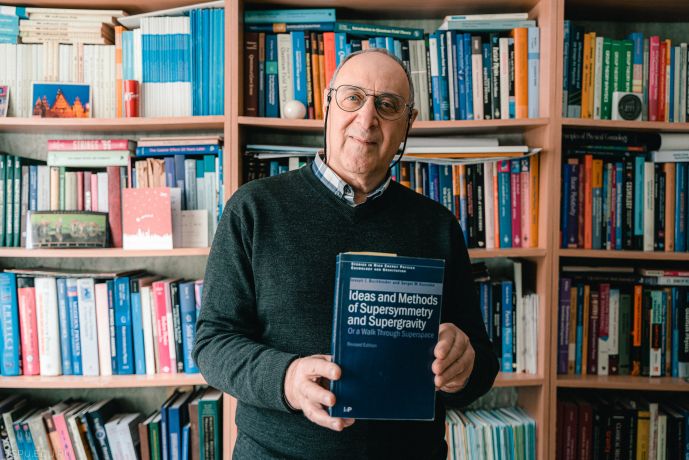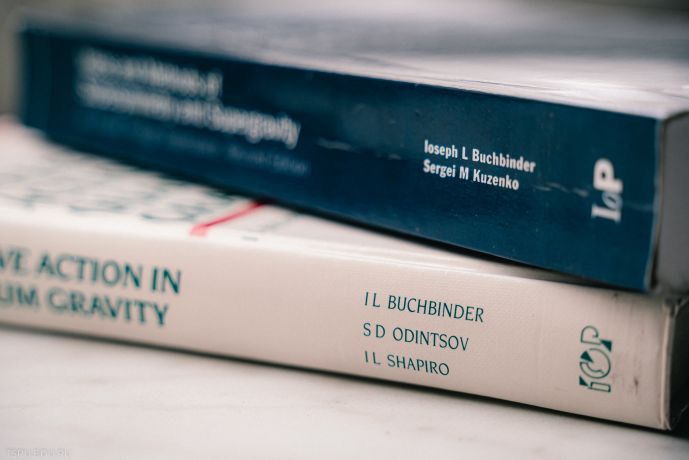In an exciting initiative aimed at guiding the next generation towards promising careers in linguistics, the Institute of Foreign Languages and International Cooperation at the TSPU (Tomsk State Pedagogical University) recently kicked off a series of career orientation events. Focused on the field of «Linguistics» with a specialization in «Translation and Translation Studies». This event brought together university students from the 2nd and 3rd years with 9th graders from Perspektiva School. The young scholars had the unique opportunity to dive into the world of translation and interpretation.
4 October 2023
GRAND CELEBRATION OF KNOWLEDGE DAY AT TSPU
The new academic year at the Tomsk Pedagogical University was celebrated on a grand scale First-year students visited their faculties, got acquainted with their classmates and supervisors. In the Pedagogical Technopark "Quantorium" a video conference with the Minister of Education of the Russian Federation Sergey Kravtsov took place. In the evening the whole university gathered at the festival "Break into the Pedagogical".
5 September 2023
TSPU OPENED A RUSSIAN EDUCATIONAL CENTER IN NAIROBI, KENYA. NAIROBI (KENYA)
On September 4, employees of the TSPU and colleagues from the Kenya Institute of Foreign Languages officially launched the Center for Open Education in Russian and Russian language teaching in Nairobi (Kenya). The Center was established within the framework of the initiative of the Ministry of Education of the Russian Federation to promote the Russian language in friendly countries of Africa, Asia and Latin America. The Center is a structural subdivision of the Institute of Foreign Languages and International Cooperation of the TSPU.
5 September 2023
AFRICAN COUNTRIES ARE LOOKING FOR COOPERATION WITH RUSSIA IN THE FIELD OF EDUCATION
African countries express interest in the program "Russian Teacher Abroad" and in teaching students according to Russian educational standards. This was announced by Denis Gribov, Deputy Minister of Education of the Russian Federation, at the strategic session of the Economic and Humanitarian Forum of the Second Russia-Africa Summit. The theme of this session was "Promoting Humanitarian Policy on the African Continent: Best Practices"
14 August 2023
The ceremony of awarding diplomas with honors to 38 best graduates of Russian pedagogical universities in the Year of the Teacher and Mentor took place at the Moscow State Pedagogical University. Sophia Lomovskaya, a graduate of the Faculty of Technology and Economics, received a red diploma from the Deputy Prime Minister of the Russian Federation Tatyana Golikova and Minister of Education of the Russian Federation Sergey Kravtsov.
14 July 2023
TSPU STUDENTS SHOW THEIR PEDAGOGICAL COMPETENCIES IN THE "CITY SUMMER" PROJECT
This week the first shift of the large-scale project "City Summer" realized by the TSPU and the Department of Youth Policy of Tomsk started. For 18 years, students of the Pedagogical University have been spending their summers with Tomsk kids who stayed in the city during summer vacations. Future teachers organize an educational and entertaining program, including sports games, handicrafts, intellectual and other activities.
14 July 2023
TSPU EXPERT JOINED THE INTERNATIONAL ECONOMIC FORUM «RUSSIA - ISLAMIC WORLD: KAZANFORUM»
The Russia-Islamic World Forum, a significant event aimed at fostering international cooperation, was held as a federal-level gathering for the first time. Over the course of two days, the forum's platforms hosted 15,000 guests from 84 countries worldwide. Among the participants was Vadim Yuryevich Zyubanov, Head of the International Cooperation Department at the Institute of Foreign Languages and International Relations,
31 May 2023
THEORETICAL PHYSICISTS FROM TSPU WON THE PRESTIGIOUS JOINT INSTITUTE FOR NUCLEAR RESEARCH AWARD
In February, the Joint Institute for Nuclear Research (JINR) announced the results of its prestigious annual award. The first prize for the cycle of scientific research titled «New Methods in Classical and Quantum Field Theory with Extended Supersymmetry» was awarded to a group of scientists, including Professor I. L. Buchbinder, the director of TSPU's Center for Theoretical Physics, and a researcher from the same center, B. S. Merzlikin. The research team also comprised scientists from the Joint Institute for Nuclear Research and Moscow State University.
The scientific group has been working on the topic for almost six years. The key achievement of the research is the formulation of new methods for constructing effective actions with preservation of explicit and hidden symmetries at all stages and their subsequent application to various field theory models in the classical and quantum domains. The results obtained were published in 22 papers, mainly in Physics Letters B, Nuclear Physics B, and Journal of High Energy Physics, and were presented in 15 plenary papers at international conferences.
JINR is a large intergovernmental organization that operates under the governance of the Committee of Plenipotentiaries and the International Scientific and Technical Council. It is comprised of several separate institutes, or laboratories, with a primary focus on research related to nuclear physics, elementary particle physics, and condensed matter physics. One of JINR's largest theoretical physics laboratories, with over 300 staff members, has collaborated with I.L. Buchbinder for many years. JINR also awards several prizes annually in the field of fundamental and applied physics.
However, this is preceded by a rather long and rigorous procedure of multistage expertise. Firstly, the scientific group applying for the prize must apply to the directorate of the corresponding laboratory and submit an extended abstract of its work. Afterwards, a scientific seminar of the relevant department is held, where the group leaders make an hour and a half report, which must be approved by the seminar. This is followed by a thorough discussion of the work at the Scientific-Technical Council of the Laboratory, where the work is nominated for the JINR Prize. Only after going through this stringent procedure will the JINR award be granted to deserving individuals or groups. The award serves as a testament to their exceptional contributions and unwavering dedication to the field of nuclear research.
The JINR prize approval process involves creating a special jury and sending the work's abstract to three independent experts. Scientists from various external Russian and foreign organizations provide positive expert opinions. The jury votes on recommendations for first, second, and incentive prizes, and submits them to the International Scientific and Technical Council for the final decision. In the case of the scientific group including TSPU scientists, positive expert opinions were provided by Dr. Ivanov from the Landau Institute for Theoretical Physics of the Russian Academy of Sciences, Dr. Petrov from the P. N. Lebedev Physical Institute of the Russian Academy of Sciences, and Dr. Johnson from the University of Maryland (USA). A team of scientists from TSPU successfully passed all stages and received the first prize in theoretical physics for 2022.
The official award ceremony will take place in June of this year.
Information about the award is posted on the website of the Joint Institute for Nuclear Research.
20 April 2023
TSPU's Pedagogical Project Takes Flight: Spring Session Engages School Students
The Tomsk State Pedagogical University (TSPU) continues its educational project, "Open Pedagogical Class," which aims to foster pedagogical activities and develop the next generation of teachers. This spring, 50 school students interested in the profession attended a three-day professional orientation session.и.
22 March 2023
Tomsk Pedagogical University embarks on a working visit to schools and universities in Kenya
The Tomsk State Pedagogical University and educational organizations in Kenya are strengthening cooperation in promoting education in the Russian language. As part of an initiative by the Ministry of Education of the Russian Federation, the Tomsk State Pedagogical University is exploring the possibility of launching Russian language training centers in friendly countries in Africa, Asia, and Latin America.
22 March 2023
Новости 51 - 60 of 679
First | Prev. | 4 5 6 7 8 | Next | Last
